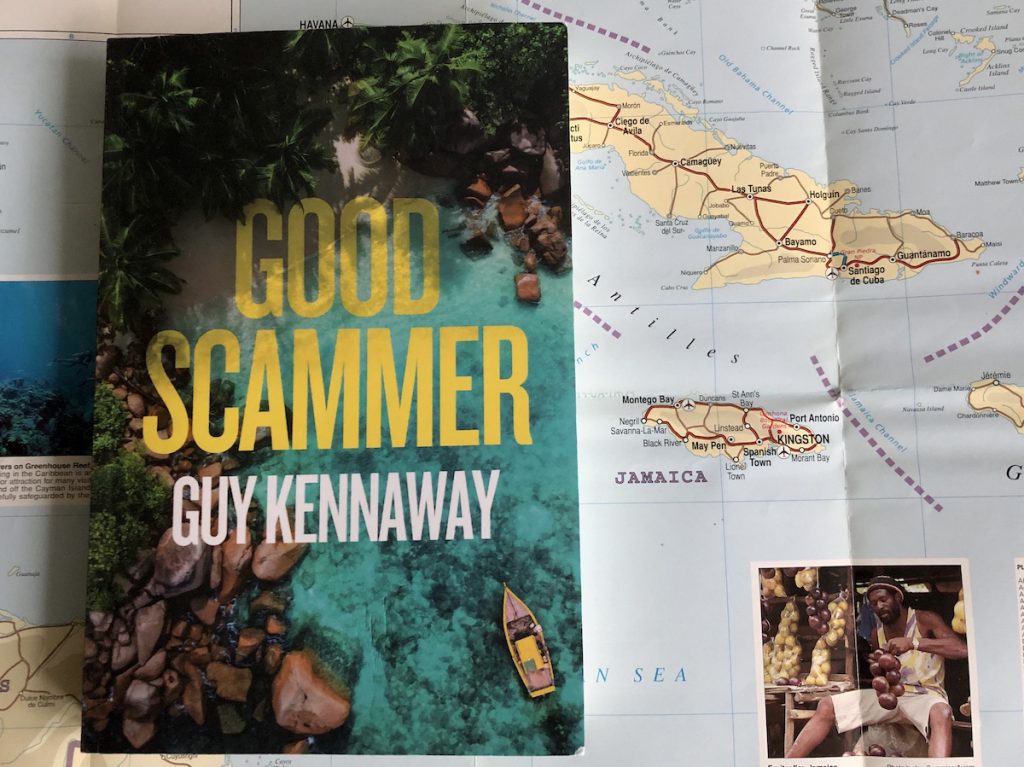
This is the book Horatio Alger would have written if an Alger hero came from a post-colonial Caribbean island awash with foreign money that never seems to trickle down to the poverty-stricken villages beyond gated tourist enclaves.
The poorly educated, semi-literate orphan at the heart of Guy Kennaway’s latest novel experiences the ‘Rise to Respectability’, sees his ‘Character Strengthened Through Adversity’, and falls in love based on his character and intellect rather than money.
So far, so good.
But Alger could never tell this rags to riches story because he lacked a sense of humour — something Kennaway has in spades.
The novel opens with a hilarious scene where crafty old Maas Henry sells an island that doesn’t belong to him to unsuspecting tourists.
His guile shows impressive attention to detail — leaving the weatherbeaten ‘for sale’ sign lying on the ground rather than propped up — and an understanding that the greed of those who encounter this ‘too good to be true’ deal will frame it as their own great luck in duping an old man who has no idea of the value of his land.
“These people let so much go to waste,” the soon-to-be-fleeced American says to his wife. “Sometimes I despair at the way the Jamaicans don’t appreciate it. They are so lazy, and stupid. […] A whole island for eleven grand? How stupid can you be.”
When they hand over the cash and get kicked off ‘their island’ by hotel security, the arrogant new owners tear a strip off a hotel manager, waving a bill of sale in his face.
The manager takes several identical documents from a desk drawer and says they aren’t the first to fall for this ruse.
When the American threatens to call the police, the hotel manager says, “You paid eleven thousand for that island? What you think it’s really worth? A million? Two million? So who really is the thief here?”
“Everyting we tek from dem, dem tek from we first,” Maas Henry tells his young protege, the book’s main character. “Never forget that.”
On an island where foreigners exploited both slave and subject, young Bangaz learns he has to be crafty to survive.
Bangaz grows up and stumbles into new scams of his own.
What begins as a call centre business collecting debts in distant America quickly morphs into an elaborate set of financial scams — like fake Publisher’s Clearing House prize cons and lottery wins — based on carefully refined phone scripts, and lead list with names, addresses, phone numbers and bank details.
The business set in motion by Bangaz turns Jamaica into “an international centre of excellence” for an estimated $300 million per year global scamming trade. And he does it without guns or threats of violence — unlike those who came after him.
Now, I admit I’m someone who likes a good prank phone call more than the next guy. I spent entire high school afternoons bringing joy to the residents of Prescott, Brockville and surrounding non-long-distance areas with a highly developed template of prank calls, alongside my friend Rob Wilson.
Unlike Kennaway’s characters, we never monetized our hobby, but I can appreciate the artistry these scammers brought to their work.
Their ruses are successful because of the greed of the victims they target. Ever eager to cash in on an implausibly lucrative but slightly shady deal, the scammed are quick to trust anonymous strangers who call up and tell them what they want to hear.
Soon the entire previously impoverished parish Bangaz lives in is booming with parties, new appliances and cars, and a shack bar that stocks champagne and Hennessy on its upper shelves.
The scammers and the government officials who turn a blind eye to the fraud justify it as a form of reparations for centuries of slavery, and centuries of exploitation that takes wealth from the island while leaving nothing behind: no universities, no foreign language schools, and no trade schools short of vocational courses that train waiters to bring their former colonizers cocktails at all-inclusive resorts.
“The British taught the Jamaicans to scam by modelling it,” says the white expat writer character who is telling Bangaz’s story. “Slavery was only survived by scamming the enslavers.”
The novel ends with the greatest scam of all, one that pulls the wool over the eyes of a gullible American publishing industry obsessed with virtue-signalling racial quotas designed to boost its own ego.
If you liked One People, Kennaway’s “love letter to a little Jamaican fishing community” called Cousins Cove, then you will really enjoy Good Scammer, where he turns his lens on a single character’s remarkable ‘rags to riches’ life.
It’s socially perceptive and extremely funny, and written by a man with an abiding love and respect for this remarkably resourceful people and their culture.
Check out my podcast conversation with Guy Kennaway here.
And get your copy of Good Scammer today ==> Buy the book
